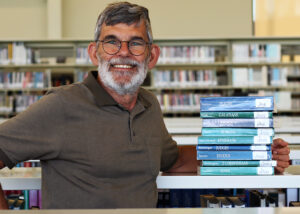I had other plans for this space; this is not the editorial I was intending to write. But, reading over this issue’s proof pages, I saw some unexpected themes emerging.
Several contributors highlight ways in which we humans try to limit the intentions/purposes of our Creator.
Columnist Troy Watson reflects on the common tendency to get attached to our own desired outcomes in a particular situation, thus inhibiting our ability to dwell more deeply in the realm of God’s person and purposes.
Columnist Christina Bartel Barkman tells about a personal dream she and her husband sought to fulfill before they found strength to live instead by more lasting values. An obituary for Bill Kruger tells of a beloved mentor who once challenged a pastor’s limited point of view: “So, is it up to you to shorten the arm of God’s grace? Is it your call who can experience love and who can’t?”
In “New vision, new life,” a Mennonite who faced criticism for working with a man who had a long military career responded: “. . . God chooses who he chooses to use. God works in a way that he chooses to work.” And a reflection on page 13 tells about a congregation’s “painful and humbling journey” towards a new kind of inclusiveness.
Also present in this issue are stories of the unexpected. For example, a pastor who doesn’t feel called to preach. And the centennial of Mennonite Central Committee (MCC), an organization born out of a simple response to human need on the other side of the world. Undoubtedly, those early organizers of MCC could not have foreseen how their simple humanitarian gestures would blossom into the worldwide ministry that MCC is today.
As I write, the Joint Council of Mennonite Church Canada is meeting and making decisions on behalf of our denomination. Since the re-structuring of our nationwide body last year, they, along with the Executive Staff Group and executive minister Doug Klassen, have been seeking to discern and participate in what God is doing in our church’s new reality. There have likely been some surprises along the way.
I’m the kind of person who likes to know what’s ahead on the path, to predict exactly what I can expect and what is expected of me. (I’ve been known to plan for spontaneity!) Yet, I’m learning to see the Spirit acting in ways that I never could have anticipated. It often demands a conscious effort to be open to the divine purposes that might be revealing themselves in new ways.
The New Testament story of Peter and Cornelius illustrates these themes so well, as John D. Rempel points out in our latest feature. Both the Jewish apostle and the gentile God-fearer had to stretch their understandings about what was happening in their individual lives and in their communities. As Rempel states it, “God intrudes on both of them,” and they couldn’t argue away the picture they saw of God’s larger intentions.
As Peter chose new ways of acting, other believers challenged him. His response offered another challenge: “Who was I that I could hinder God?” This question grew out of his attentiveness to the dream given to him by the Spirit and to the “coincidences” taking place around him. Because of the choices this leader made, the early followers of Jesus began opening their arms and eventually grew into the body that today we call the church.
The God of the Bible often surprised people with new challenges and unexpected opportunities. That same Spirit is at work today in ways we cannot imagine or plan for. The challenge for those first Christ-followers—and for all of us—is to expect the unexpected and to see God’s “interference” through the eyes of faith.
In this challenge of discipleship, how is God calling us to respond? What unexpected good might come out of these new situations? Let’s resist the temptation to hinder God’s work and instead respond with joy and a spirit of adventure.
Read more editorials:
Cultivating hope
Reporting on #ChurchToo
#ICYMI: 2019 in review
Church publications: Which way to go?
What shall I wear: Sport coat or cardigan?









Leave a Reply
You must be logged in to post a comment.